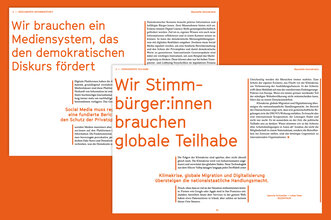We as voters need global participation
The consequences of the climate crisis are being noticed, but not to the same extent everywhere. The climate crisis is fueled by industrialized countries and is devastating the global South. New technologies from Silicon Valley are slowly putting every small village shop under pressure without being able to do much about the situation. Companies like Google and Apple were founded in San Francisco, but now operate services all over the world, have data centers in countries like Ireland, but don't pay taxes in any of these places.
At the same time, people are becoming increasingly mobile. To protect their livelihoods, to escape the climate crisis, to improve their educational opportunities. In Switzerland, this mobility comes up against one of the most restrictive naturalization policies in Europe. If an ever increasing proportion of the permanent resident population cannot participate in decision-making, this leads to a democratic deficit. The climate crisis, global migration and digitalization exceed the power of the nation state to act. In the area of data protection, it is clear that only common regulations (such as the GDPR) have an impact. International cooperation is therefore needed to find solutions, not just search for them. It is also time to rethink political participation: why are we in Switzerland voting on working conditions in Asia? Approaches that focus not on membership of a nation state, but on the people affected, are the necessary counterpart to international organizations.
We need a media system that promotes democratic discourse
Digital platforms have fundamentally changed the way we consume media. Unlike traditional media companies, these platforms are not regulated and the origin of information is less obvious. Since this development, high-quality journalism has increasingly struggled for sustainable funding as advertising revenue shifts. However, the business model of popular social media primarily maximizes users' time on the platforms and not the quality of the information. The algorithms of social media prefer provocative, polarizing content. As a result, fake news and disinformation threaten to spread further and further, which seriously jeopardizes democracy.
Democratic consensus requires precise information and empowered citizens. There are two possible measures: Firstly, digital literacy skills must be promoted throughout society. The aim is to be able to reflect on one's own knowledge as well as new information and put it into context. This will enable the democratic opinion-forming process to deal with digital realities. Secondly, social media must be regulated in order to guarantee solid reporting and the protection of privacy and therefore democratic values. International legislative packages are an important instrument here, for example to promote the marketplace principle. However, these can only be enforced in the legislative process if there are high transparency and lobbying regulations. Switzerland must position itself proactively and seek international cooperation.
Read entire working paper
This working paper was funded by the Mercator Foundation Switzerland and the Swiss Society for the Common Good SGG.


